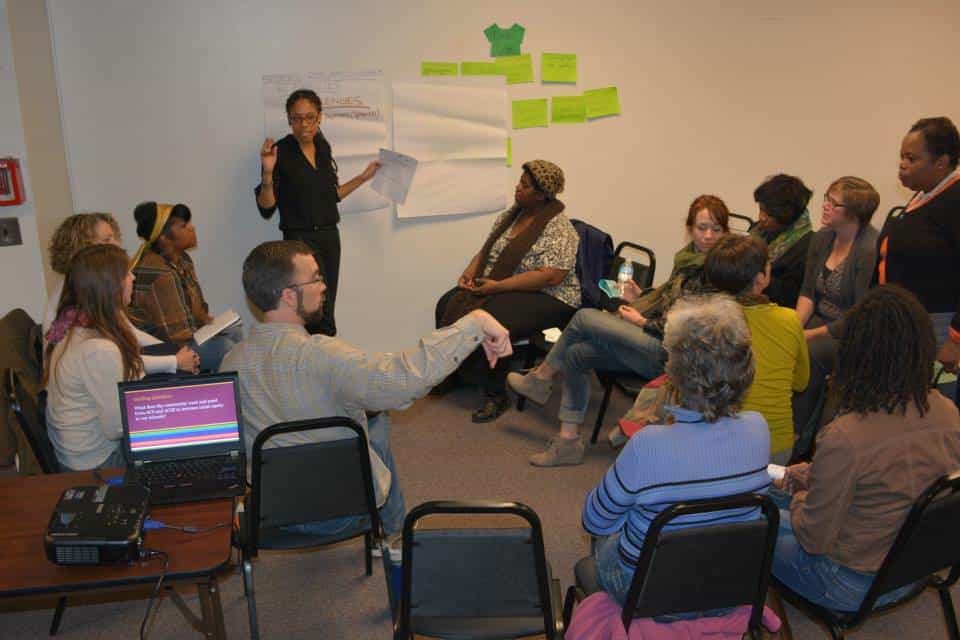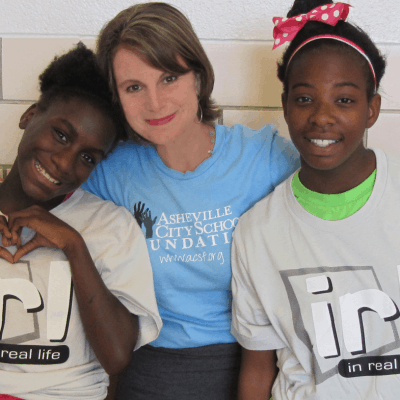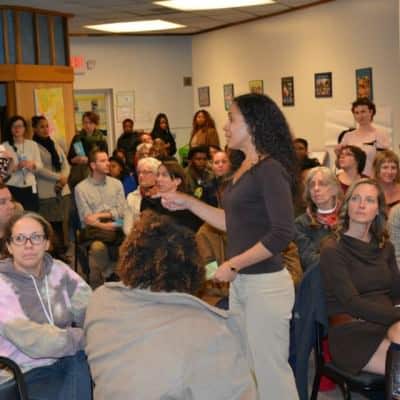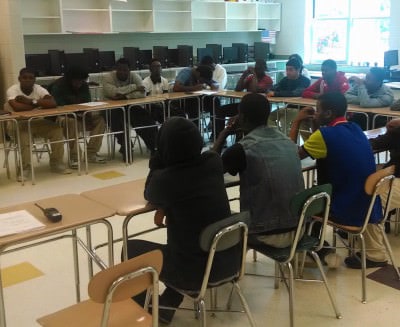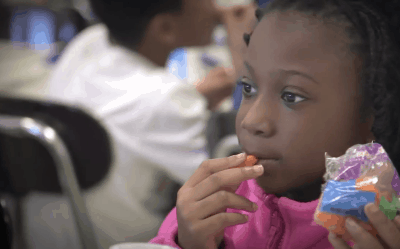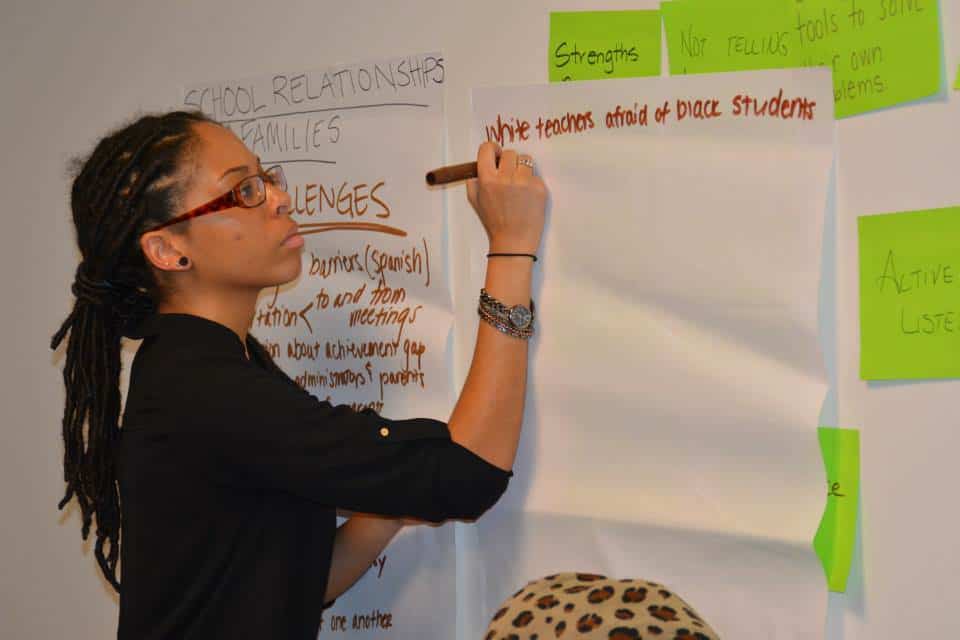

Before we jump in, let me introduce you to two organizations. The Asheville City Schools Foundation (ACSF) is a nonprofit organization dedicated to education success for all city school students. Parent U, a program of the Asheville City Schools, brings together parents, families, faculty, and staff with institutions of higher education, nonprofits, and community leaders to promote the social, emotional, and academic success of all students.
Now, let me introduce you to the two women who help lead these organizations. Kate Pett has been the executive director of ACSF for seven years. Marta Alcala-Williams is the Parent Engagement Coordinator for Parent U and a board member for ACSF. Kate is white, Marta is Hispanic.
Finally, some background on the school district before we get started. The Asheville City Schools enrolled 4,230 students in 2014 – of these, 296 were Hispanic, 995 were black, 365 identify as other non-white, and 2,574 are white. In 2012-13, 47 percent of the students qualified for free or reduced price lunch. The total per pupil expenditures including child nutrition is $11,213.10, 9th highest in the state.
The organization decided to bring the issue of race equity into all the work they do at the foundation.
For ACSF, the story of these race equity conversations begins in 2013. Kate says a project to examine racial equity within the organization “led us to understand the ways in which we had organizational structures that prevented the Latino and African American members of the community to become leaders on the board of directors, to engage and feel safe enough to bring up their most challenging and pressing issues, and to tell their truths.” The organization decided to bring the issue of race equity into all the work they do at the foundation. The board of directors raised $20,000, which it used to provide grants to four schools for teacher- and parent-led race equity projects. Those projects are currently underway and will end in June 2015. Some examples of projects in the four schools are book discussions, race equity trainings, examining the history of desegregation in Asheville, and parent engagement surveys.
For Kate and Marta, this work has been personal and professional. Both will tell you that the journey to bring race equity to the students, parents, and schools of the Asheville City School system will stick with them for the rest of their lives. It has not been easy. It pushes their limits, stretches their edges, and encourages them to grow. Marta says, “Now is the time to do this work.” Kate was resistant at first, thinking “it would be more talking without results.” However, she says, “The process has made me a believer.”
By having educators, parents, and students become equally involved it should be possible to tackle race equity and become a successful model for other school districts to follow or draw from as an example.
Kate and Marta were both interested in launching programs on race equity so they came together to collaborate. Kate’s focus is on organization and systemwide issues while Marta’s focus is on the feelings and the systems of oppression that exist. Together, they are able to connect, according to Marta, and work with the people on a very basic level of understanding and approachability.
Creating, implementing, and fostering race equity programs should support more students of color, encouraging them to take part in more honors and AP classes, qualifying them to participate in an annual banquet, and eventually walking across the stage at graduation equally well prepared for the challenges ahead.
The race equity projects launched in the 2014-15 school year, and Kate and Marta are thinking about how this work going forward can be practical and tangible to the students. They also agree that all parents need to be involved in the process. By having educators, parents, and students become equally involved, it should be possible to tackle race equity and become a successful model for other school districts to follow or draw from as an example.
What have they learned?
Parent- and teacher-led race equity grants are the cornerstone of this work. Kate wants to be sure that the inequalities that exist today are not a problem we are still working on in 5, 10, or 20 years. She says, “We have an expectation that this problem will be with us forever. We need to change that expectation!”
Kate framed up four ways that schools could implement similar programs from the lessons she and Marta have learned along the way.
- The first necessary ingredient is readiness. The district should be in the position to “put key people in place to be the truth tellers.” Asking questions like what is happening to our communities of color and why are they disengaged or engaged? It is key to be able to ask the questions in a way that makes people feel heard and by someone who understands race equity and the community.
- Second, partnering with agencies outside of the schools system is essential. “Organizations bring a perspective and resources that help to shake up the way schools see their work.”
- Third, start from the bottom up. The grants are offered to school-based teams. Including the teachers and parents gets to the root of the problem and creates more buy in from the participants.
- Once ready, hire consultants. Hire people who understand the schools systems, are directly affected by the issues, and have done their own power, privilege, and oppression analysis.
Kate and Marta are having the difficult conversations about race equity together, in their own organizations, and in the community. They embody the words of Cornel West in their leadership style, setting a great example for schools across North Carolina.
“We want great leaders – who love the people enough and respect the people enough to be unsought, unbound, unafraid, and unintimidated to tell the truth.”
– Cornel West
